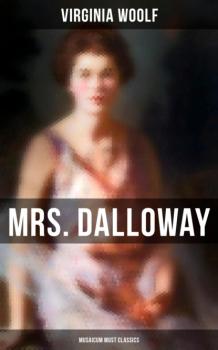Virginia Woolf
Список книг автора Virginia WoolfMrs. Dalloway (Musaicum Must Classics)
Clarissa Dalloway, the wife of a Conservative member of parliament, is preparing to give an evening party, while the shell-shocked Septimus Warren Smith hears the birds in Regent's Park chattering in Greek. There seems to be nothing, except perhaps London, to link Clarissa and Septimus. She is middle-aged and prosperous, with a sheltered happy life behind her; Smith is young, poor, and driven to hatred of himself and the whole human race. Yet both share a terror of existence, and sense the pull of death. The world of Mrs Dalloway is evoked in Woolf's famous stream of consciousness style, in a lyrical and haunting language which has made this, from its publication in 1925, one of her most popular novels.
Mrs. Dalloway
Widely heralded as one of the first truly modern novels, Virginia Woolf’s “Mrs. Dalloway” was published in 1925 and is one of the author’s most popular and critically acclaimed works. All of the events of the novel take place on a single day in June 1923 and the novel’s perspective varies often as Woolf journeys inside the minds of many characters as they each experience the day and connect its events to the memories of their past. The two main characters are Clarissa Dalloway, a wealthy woman of high society who is planning a party for that evening, and Septimus Warren Smith, a veteran of the First World War, who continues to suffer from the trauma he experienced on the battlefield. Both characters are constantly aware of the passage of time, as Clarissa often reflects on her happy youth and her missed opportunities for love and passion and Septimus is haunted by his memories of the horror he witnessed and feels death looming ever closer and closer. Heartbreaking and powerfully evocative, “Mrs. Dalloway” is a timeless masterpiece about finding the joy in little things while never completely forgetting the fleetingness of life and the inevitably of death. This edition includes a biographical afterword.
Al Faro
Con un velo de continua melancolía que va cubriendo sutilmente cada capítulo, Adeline Virginia Stephen, mejor conocida como Virginia Woolf, agrega su vanguardista estilo poético en una novela que posee una belleza sutil y encantadora, que decididamente lo dejará pensando (y recordando) en las vicisitudes de la vida. Esta obra, publicada en 1927 en Inglaterra, pone los fundamentos de la icónica feminista que será Woolf en nuestros tiempos. En 1941, a sus 59 años de edad, y padeciendo trastorno bipolar, desconocido en su época, Virginia Woolf decide quitarse la vida ahogándose en un río poniendo piedras en las bolsas de su abrigo. Una muerte tan poética como lo fue toda su obra.
Die Jahre
Woolfs vorletzter Roman, mit dem sie große Erfolge feierte: Dieser drei Generationen umspannende Familienroman, der sich von 1880 bis in die 1930er Jahre erstreckt, erzählt das Leben der Londoner Offiziersfamilie Pargiter. Hierbei geht es um die Schicksale der Großeltern, Eltern und Kinder, die über die Jahre begleitet werden. Die auf den ersten Blick für Woolf ungewöhnlich konventionelle Erzählweise wird durch wiederkehrende, das Gestern und das Heute verbindende Augenblicke aufgebrochen.-
THE ART OF BIOGRAPHY
This collection contains 15 essays on The Art of Biography by Virginia Woolf. Contents: The New Biography. A Talk about Memoirs. Sir Walter Raleigh. Sterne. Eliza and Sterne. Horace Walpole. A Friend of Johnson. Fanny Burney's Half-Sister. Money and Love. The Dream. The Fleeting Portrait: 1. Waxworks at the Abbey. The Fleeting Portrait: 2. The Royal Academy. Poe's Helen. Visits to Walt Whitman. Oliver Wendell Holmes. Adeline Virginia Woolf (25 January 1882 – 28 March 1941) was an English writer, and one of the foremost modernists of the twentieth century. During the interwar period, Woolf was a significant figure in London literary society and a central figure in the influential Bloomsbury Group of intellectuals. Her most famous works include the novels Mrs Dalloway (1925), To the Lighthouse (1927) and Orlando (1928), and the book-length essay A Room of One's Own (1929), with its famous dictum, «A woman must have money and a room of her own if she is to write fiction.»









